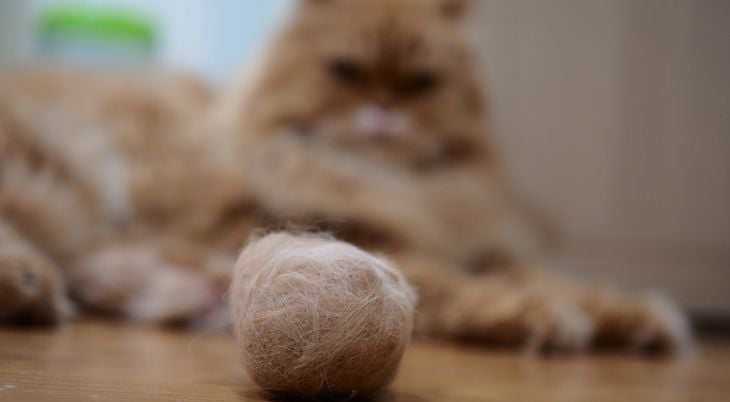Hairballs
- Created in Feline, Pet Health, Digestive and Oral Health

Cat owners are all too familiar with that distinctive sound that cats making when trying to expel a hairball, often in the middle of the night. However, did you know that coughing up hairballs is crucial to your cat? The inability to do so can result in a deadly intestinal blockage.
Anatomy of a Hairball
Cats’ fastidious grooming habit means they swallow a lot of their own fur. Little projections on your cat’s tongue catch the hairs and propel them down the throat. However, keratin, the insoluble protein prevalent in hair, is indigestible. Most of the hair makes it through your cat’s system and winds up as feces. Some fur accumulates in the stomach, growing and growing until it starts to obstruct the digestion process. When this happens, you will hear that unique hacking sound, until out pops a wet, cigar-shaped, bile-soaked trichobezoar, which is commonly known as a hairball. A typical hairball measures 1 inch long, but cats have produced some as big as 5 inches long and 1 inch thick. Usually gastric secretions make the hairball slightly darker than the cat’s coat. Long-haired cats and excessive groomers or shedders may produce up to one hairball per week.
Hairball Hazard
Hairball ejection is normal and healthy. The problems start to occur when your cat stops eating and keeps retching. This could indicate a serious intestinal blockage. Suddenly, the annoying hairball has become life-threatening.
If your veterinarian suspects a dangerous hairball, he or she will use a combination of X-rays, blood work, ultrasound tests and physical palpation to diagnose the problem. Sometimes laxatives can expel the hairball through the digestive tract. If the hairball is too large or tightly lodged, surgery may be necessary.
Help for Hairballs
You can help your cat prevent the dangers and everyday indignities of hairballs by daily brushing his or her fur, and then wiping away loose hairs with a cloth. If your cat is averse to brushing, find a good groomer to visit at least once per year. Some types of high-fiber cat foods can decrease hairball production. Ask your veterinarian if hairball remedies, such as mild laxatives, are appropriate for your cat.
How do you know when to call the vet? If your cat’s constipated, refuses to eat or has been gagging for more than a day, call our office immediately. We are happy to help.
